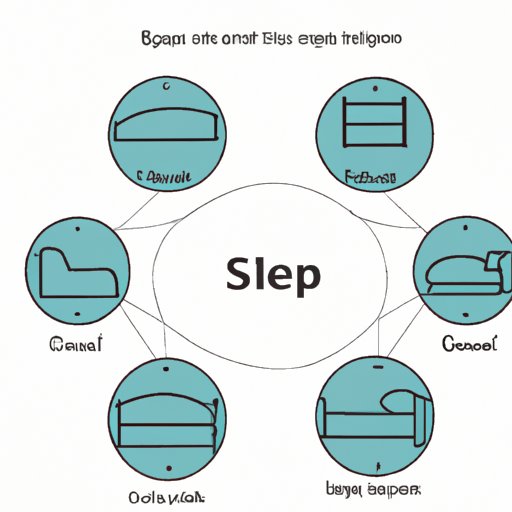
Introduction
Sleep is a vital component of our daily life that helps us recharge and rejuvenate. Getting enough quality sleep is crucial to our overall health and well-being, from improving our physical performance to enhancing our cognitive function. Unfortunately, many people fail to get adequate sleep, which can have numerous adverse effects on their health, productivity, and happiness. So, in this article, we will explore how much sleep you should get and why it’s essential to get the right amount.
The Science behind Sleep: How Much Is Too Much?
Sleep is a complex process that occurs in different stages, each with its unique function and benefit. These stages include light sleep, deep sleep, and rapid eye movement (REM) sleep, the stage during which you dream. Each stage has its duration and frequency, impacting your overall health and well-being. Research suggests that the recommended amount of sleep for adults aged 18-64 is between 7-9 hours, while adolescents should aim for 8-10 hours and children between 9-11 hours of sleep.
However, several factors can affect your sleep quality and quantity, including age, lifestyle, and health issues. Consistently getting too little or too much sleep can have severe impacts on your physical, emotional, and mental health. Those who get too little sleep may experience fatigue, lack of concentration, high blood pressure, and chronic health issues such as obesity, diabetes, or heart disease. On the other hand, oversleeping can lead to depression, cardiovascular disease, and an increased risk of mortality. Therefore, it’s essential to find the right balance for your health.
Sleep like a Pro: Tips for Getting the Right Amount of Shut-eye
Getting enough quality sleep is not only about the quantity, but it’s also about the quality of your sleep. Even if you get the recommended number of hours, poor sleep quality can undermine the benefits of sleep. Here are some tips for improving your sleep quality and duration:
- Create a Sleep-Conducive Environment: Keep your bedroom quiet, cool, and dark. Invest in a comfortable mattress and pillows. Use eye masks, earplugs, or white noise machines if needed.
- Establish a Bedtime Routine: Set a consistent sleep schedule that allows your body to adapt to a regular sleep-wake cycle. Wind down before bed by reading, listening to music, or taking a warm bath.
- Avoid Sleep-Disrupting Habits: Avoid caffeine, alcohol, nicotine, and large meals before bedtime. Put away electronics, especially screens, at least an hour before bed.
The Effects of Too Little Sleep and Too Much Sleep
The effects of getting too little or too much sleep can be severe and negatively impact your physical and mental health. Lack of sleep can lead to various health issues, including:
- Increased risk of high blood pressure, heart disease, and stroke
- Weight gain and obesity
- Diabetes and metabolic issues
- Reduced sex drive and fertility
- Poor immune function and slow healing
- Poor mental health, including anxiety, depression, and memory impairment
While oversleeping can increase the risk of:
- Depression and anxiety
- Increased pain sensitivity and inflammation
- Cardiovascular disease and stroke
- Obesity and diabetes
- Higher mortality rates due to various health conditions
The Sleep Sweet Spot: Finding the Right Balance for Your Health
Finding the right balance of sleep is crucial to achieve optimal health and well-being. While the recommended amount of sleep varies by age and individual factors, it’s generally between 7-9 hours for adults and 8-11 hours for adolescents and children. Finding the right balance also involves considering individual factors such as genetics, lifestyle, and sleep quality. Monitoring and adjusting your sleep routine can help maintain a healthy sleep pattern. Avoiding extremes of oversleeping or under-sleeping will help you find the right balance for you.
Sleep and Productivity: How Much Is Enough to Boost Your Performance?
Sleep deprivation can significantly impact job performance, decreasing cognitive function, reaction time, and even increasing the risk of accidents. Sleep is essential for information retention and creativity. Getting good quality sleep enhances your problem-solving ability, boosts creativity, and elevates your mood. Inadequate sleep also increases irritability and can impact your relationships with co-workers and loved ones. Therefore, it’s essential to ensure you’re getting adequate sleep to perform your best at work or study.
The Sleep Myth Debunked: Why Compromising on Bedtime Can be Harmful
While many people claim they can get by on little sleep, this is generally not the case. Research shows that even one night of insufficient sleep can significantly impact your cognitive function and mood. Moreover, compromising on bedtime can also increase the risk of chronic health issues in the long term. Respecting your sleep needs is crucial to improve your health, happiness, and productivity.
Conclusion
Sleep is essential to our overall health and well-being. Getting enough quality sleep helps us perform better in various aspects of our daily lives and reduces the risk of numerous health issues. While the ideal amount of sleep varies by individual and age, finding the right balance is crucial to achieve optimal health. Prioritizing sleep, creating a conducive sleep environment, establishing a sleep routine, and avoiding sleep-disrupting factors all contribute to maintaining a healthy sleep pattern. So, don’t compromise on your sleep, make effort and prioritize sleep for optimal health and performance.





